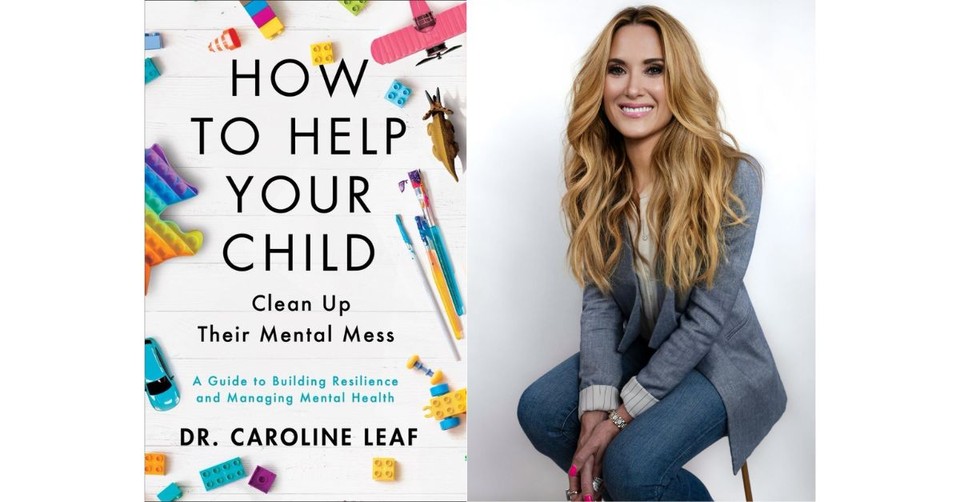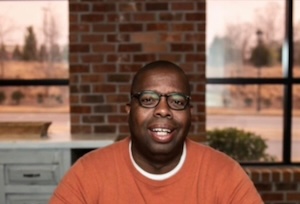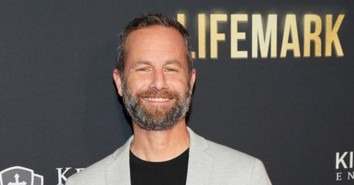Interview with Dr. Caroline Leaf, NYT Best Selling Author and Licensed Counselor on Youth Mental Health Crisis

New York Times Best Selling author and licensed counselor Dr. Caroline Leaf believes we are in a mental health crisis regarding children and young adults. Leaf has written a new book on helping parents clean up their child’s mental health mess. Leaf believes God has given parents the spiritual authority to lead and guide their children to mental health. In her new book, Leaf lays out a five-step plan for how parents can teach their children to navigate and manage their minds to stand up to the mental health issues around and within them. In a sit-down interview with Christian Headlines, Leaf answered questions on how parents can walk in confidence and faith during this complicated time in human history.
Why did you decide to write How to Help your child clean up their mental mess?
Mental health and healing is a lifelong journey that starts the moment we are born. A child with underdeveloped mind management tends to be more vulnerable to intense feelings of confusion and overwhelm as they attempt to process what they’re exposed to if they don’t have the mental skills necessary to understand what is happening to them or to communicate what they are going through. I wrote his book to help parents, grandparents, teachers, and caregivers teach children to navigate the world we live in and the highs and lows of life so their unmanaged stress and or trauma does not become their unmanaged future.
What do you say to the parent who is wrestling with children in the area of mental illness?
First, I would strongly advise not talking about the struggles of life and our and our children’s reactions to these struggles as “mental illnesses.” Rather than pathologizing the challenges children face and medicalizing misery, we should help ourselves and our children understand what we are going through as a part of life, something that we can learn how to manage so these experiences play out into our future in the way we want them to. We need to help our children see that although we can’t change what happens to us, we can change what this looks like in our mind, brain, and body and how it plays out in the future.
Second, if you are struggling as a parent, don’t beat yourself up! Messy parenting is normal, and we don’t always know what to do or how to help our children as they experience the “messiness” of life. The best thing we can do to support our children is to be there for them without judgment, listen to them, validate their emotions, and create a space at home where they feel like they can communicate and work through what is bothering them. We can’t “fix” everything or prevent our children from struggling, but we can try to provide for their physical and emotional needs by creating a place of comfort—a safe space for them to tell their stories and learn how to write their own narratives.
Third, be an example! Show your children how important mental health is by prioritizing your well-being and working through your own issues. Children are very insightful and respond to authenticity, so be honest and show them how you manage your mental health and the challenges you are going through (in an age-appropriate manner, of course). Indeed, the best way to help your child is for you to help yourself so that you can truly be there for them when they need you.
Fourth, never assume you fully understand what they are experiencing. Parenting or caring for children involves actively learning how to let them share what they are experiencing from their perspective. They are the experts on who they are and the lived experiences they have, and it's our responsibility, as the adults in their lives, to validate their uniqueness, support them, and help them embrace, process, and reconceptualize their own narratives.
Lastly, take responsibility where it is needed. Understand that not everything is your fault. However, also try to look inward and assess your role in your child’s life. By becoming aware of your emotions, perceptions, behaviors, and bodily sensations, you can better evaluate your role as a parent or caregiver and see if there are ways you can improve how you communicate with your child. And, if you find areas where you may have made a mistake, take responsibility and process this with your child, apologizing for the impact. Let them know that you will show up for them in a better way. This is also a great example for your child, showing them what self-regulation and self-awareness look like.
Why do you think we're facing a mental health crisis?
The mental health crisis is a symptom of a larger crisis: a lack of mind-management skills. Additionally, the current mental healthcare system is dominated by a biomedical model that is very quick to diagnose and label rather than describing a person’s story and looking at how they are acting through the context of what they have gone through. This often exacerbates the issues people of all ages face, divorcing their struggles from their stories.
When it comes to children, we also have to consider how mental health challenges have always existed but in different ways depending on the time and culture. Take bullying—it isn’t a new phenomenon exclusive to 21st-century children. Now, however, children take bullying home with them on their phones or devices. As parents, educators, and guardians, we need to consider these new challenges as we teach our children (and ourselves!) how to manage our mental health.
What did you discover during your research of the book?
As parents, guardians, and educators, we play a vital role in helping our children understand how important mind management is and how their minds play in their lives.
What will parents walk away with from reading the book?
Parents will walk away with a detailed guide on how to help their children understand their mind and mental health and how to teach their children how to develop the mental skills necessary to understand what is happening to them and to communicate and manage what they are going through.
As a parent works through the information in this book, they will learn how to create a safe environment for their child to work on their mental well-being and give them the skills needed to tell their own stories. This isn’t a book about learning how to solve all your child’s problems or make their pain go away because this is improbable. Parents will, however, learn how to help their children ask the kind of questions they need to ask and receive the kind of mental help they require.
How does the mind-brain-body connection work?
With or without mind management, just by virtue of being human, children wire life experiences into the neural networks of their brains and throughout their bodies with their minds. This process changes the mind, brain, and body—it has an impact that will manifest itself in how a child functions mentally and physically.
We are psychoneurobiological creatures, and the mind, brain, and body are intricately connected. The mind uses the brain to store what it experiences, the events and circumstances of life, as “thought trees.” We respond and react to these experiences while awake and sort them out while we sleep, which is why we have dreams and nightmares. A thought is, therefore, the product of the “mind-in-action.” A thought is a physical thing, made of proteins and chemicals, that occupies mental real estate in the brain as a tree-like structure on our neurons and as gravitational fields in the mind and the cells in our body.
Regarding the mind-brain-body connection, the brain and body are the physical parts made of matter, whereas the mind is the energy part made of electromagnetic waves and gravitational fields. They’re separate but inseparable because they all need to work together to function as living humans in the world. This means that whatever we experience with our minds goes through the brain and the body, which is why mind management is so important. If we don’t manage the impact of our experiences, they can affect our mental and physical well-being.
How does one understand the mind?
Understanding this process of mind management begins with understanding the mind. The mind is how we think, feel, and choose in response to everything going on around us while we are awake. The mind’s thinking, feeling, and choosing work together as a team to “grab” our life experiences and put them into our brains as energy. This energy results in structural changes in the brain that contain the memories of our experiences, which cluster together into thought, like the branches on a tree. The mind drives these changes through a process known as neuroplasticity. The mind plants our experiences into the brain as “thought trees.” Thought trees are the neurons made of axons and dendrites in the brain.
How can the church help parents dealing with mental illness issues with their children?
Community is essential for all humans—we are social creatures, and community is integral to our mental and physical well-being. We can find community at work, school, sports, social clubs, churches, mosques, and temples. The church can offer a place for people to gather together and build community—where they can find support as they walk through life's challenges, including raising mentally resilient children!
Most counselors, teachers, and those who work with children and youth believe that our children were facing serious challenges before the COVID-19 pandemic, which has only risen after the pandemic.
Leaf feels like her calling is to help the body of Christ use the mind of Christ that God has given us as believers. Leaf truly believes that if we take God's word, we can live and help our children walk through and navigate with confidence and boldness no matter what the culture throws their way.
Photo Courtesy: ©Baker Publishing Group/Jay Leaf-Clark

Originally published October 12, 2023.







